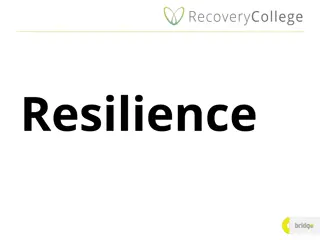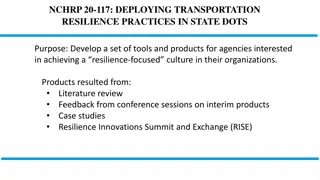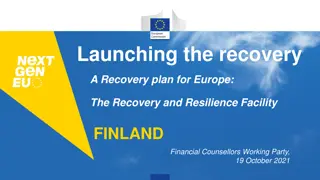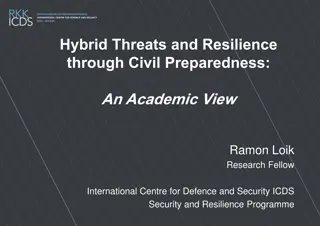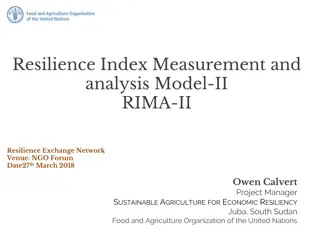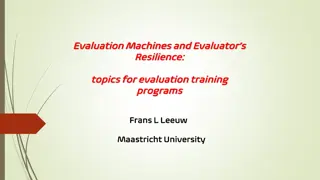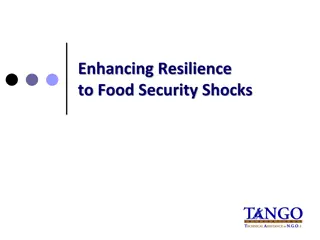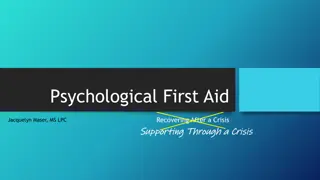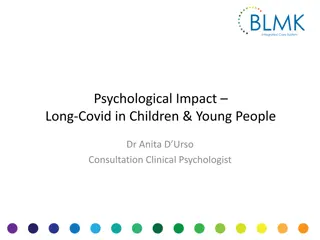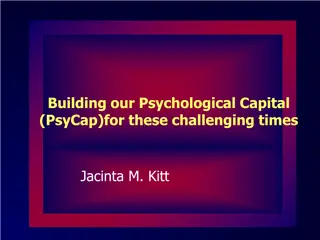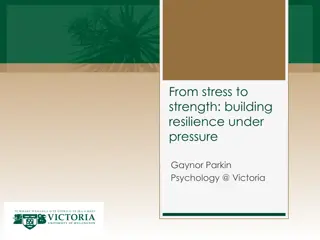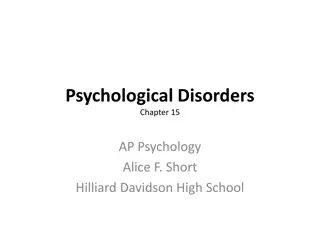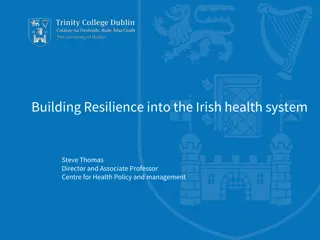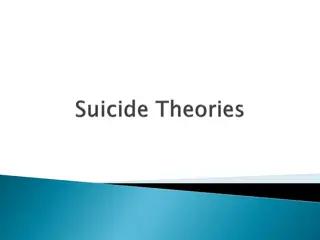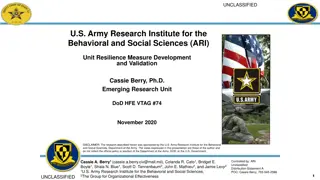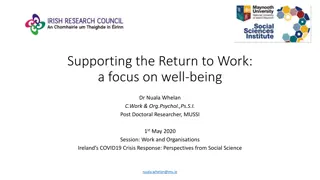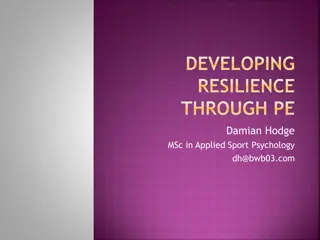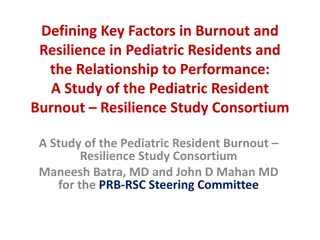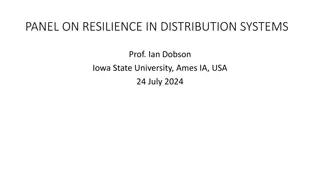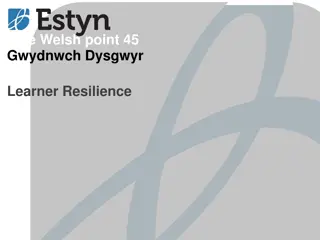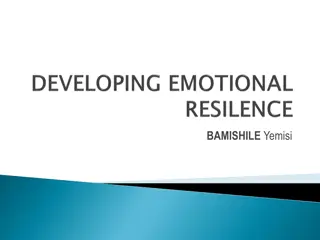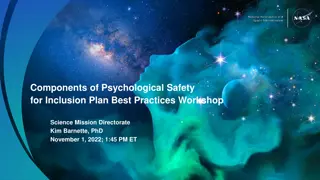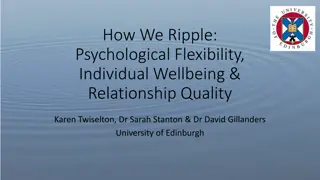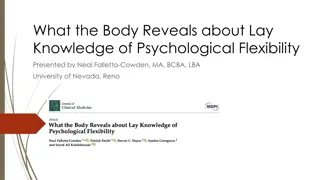Understanding Psychological Claims in the Workplace
Exploring the rise of psychological claims in work comp, this information covers types of mental stress claims, psychological claim regulations by state, standards of causation for physical injury-mental stress and mental stress-mental stress, as well as examples of how work-related stress can impac
1 views • 22 slides
Enhancing Educational Resilience with RESTA Model
RESTA is an evidence-based intervention model designed to boost Educational Resilience in young individuals by involving educational staff. It differs from other support models by incorporating insights from educational resilience and trauma-responsive practices. Two underpinning models and RESTA pr
0 views • 12 slides
Enhancing Urban Resilience in BRICS through Integrated Infrastructure and Sustainable Development
Dr. George Tsibani discusses the importance of water resilience, sustainable development goals, and the role of BRICS in fostering smart cities and rural-urban integration. The focus is on building resilience in urban water systems for economic growth and societal well-being. Solutions are proposed
1 views • 14 slides
Cummins Supply Chain Resilience Session Overview
Explore how Cummins has invested in supply chain resilience after a major flood in 2008, including partnering with Horizonscan for a Supplier Resilience Program. Discover insights into their approach, benefits to suppliers, and the importance of supplier resilience. Follow their journey and internal
1 views • 10 slides
Responsibilities in Ensuring Psychological Health and Safety
The primary duty of care under the WHS Act 2011 encompasses physical and psychological health. Non-compliance can lead to significant penalties, including fines and imprisonment. To address psychological impacts, implementing strategies like ALGEE from Mental Health First Aid Australia can help redu
0 views • 8 slides
Understanding Stress and Resilience in Older Adults
Explore the complex interplay between stress and resilience in older adults, examining models of physical and neurological resilience, recovery trajectories after hip fracture, and dynamic indicators of resilience. Considerations include psychosocial resilience factors like external support, social
0 views • 19 slides
Building Resilience and Dealing with Stress: A University Guide
Explore the concept of resilience, signs of stress, and practical strategies to manage stress while navigating university life. Reflect on challenges, create supportive connections, and improve personal resilience through actionable plans. Remember, resilience is about bouncing back, working through
0 views • 12 slides
Building Resilience: A Guide for Families
Explore examples of adversity and the importance of resilience. Learn what resilience is, how it can be developed, and why it matters. Discover ways parents and caregivers can assist children in building resilience through practical strategies. Myth versus reality around resilience is debunked, emph
0 views • 15 slides
Disaster Resilience Strategy in Developing Countries Vulnerable to Natural Disasters
The IMF's policy paper highlights key challenges faced by small states in building resilience, such as under-investment and donor support post-disaster rather than pre-disaster. The Disaster Resilience Strategy (DRS) emphasizes three pillars for intervention: post-disaster resilience, financial resi
0 views • 11 slides
Understanding Resilience: Coping and Thriving in Challenging Times
Resilience is the key to maintaining well-being in difficult situations, helping us cope with life's challenges and adapt to adversity. It plays a crucial role in protecting mental health and can be developed by anyone regardless of personal history. Learn about risk and protective factors, reflect
0 views • 16 slides
Deploying Transportation Resilience Practices: Tools and Insights
Develop tools for fostering a resilience-focused culture in state DOTs through literature review, case studies, and feedback. Explore various definitions of resilience, including organizational perspective, and key observations from the Transportation Resilience Innovations Summit. Emphasize the imp
0 views • 32 slides
Finland's Recovery and Resilience Plan for Europe: Overview of Key Initiatives
Finland's Recovery and Resilience Plan focuses on addressing challenges identified in CSR reports through a balanced response that promotes growth, resilience, and social impact. Key areas include green and digital transitions, resilience in health and social care, competitiveness and growth, and ed
0 views • 10 slides
Unbound Minds Psychological Clinic For Children And Adolescent | Book Now
Unbound Minds Psychological Clinic, is a top-notch psychological clinic, we dedicated genuine & best psychological treatment with professional team. Get certified treatment with more benefits. Hire our experienced psychologist and get rid of stress a
1 views • 2 slides
Understanding Hybrid Threats and Resilience through Civil Preparedness
Exploring the concept of hybrid threats that combine external threats and internal vulnerabilities, this academic viewpoint by Ramon Loik emphasizes the importance of civil preparedness in building resilience against crises. It delves into aspects such as target selection, active influencing, and th
0 views • 11 slides
Understanding the RIMA-II Model for Resilience Measurement in Agricultural Development
The RIMA-II model offers an innovative quantitative approach to measuring resilience in the context of food insecurity. It provides a framework for understanding how households cope with shocks and stressors, enabling effective assistance for vulnerable populations to build food secure and resilient
5 views • 18 slides
Theories of Causation in Psychological and Social Sciences
Overview of theories of causation categorized into psychological, social psychological, and sociological perspectives. Psychological theories focus on instinctive, biological, and psychological qualities of abusers, including Attachment Theory, Psychodynamic Theory, Social Learning Theory, and Situa
0 views • 15 slides
Insights into Building Evaluator Resilience for Effective Evaluation Programs
Explore topics on evaluator resilience, incorporating training insights, and the importance of ethical-behavioral approaches in evaluation. Understand the challenges, paradoxes, and strategies for building resilience to navigate complexities in evaluation practice. Learn from examples of insufficien
0 views • 8 slides
Understanding Resilience in Food Security Shocks
Resilience in the context of food security shocks involves the ability of individuals, households, communities, and systems to bounce back and recover from various stressors. This resilience is crucial in regions facing continuous crises like the Horn of Africa and the Sahel, where factors beyond we
1 views • 21 slides
Understanding Resilience: A Comprehensive Exploration
Resilience is portrayed as a dynamic process rather than an inherent trait, accessible to all individuals. The capacity for resilience can be developed and harnessed through various resources and support systems. This narrative delves deep into the ordinary yet powerful aspects of resilience, emphas
1 views • 13 slides
Psychological First Aid: Supporting Individuals Through Crisis
Psychological First Aid (PFA) is a compassionate intervention aimed at stabilizing acute distress and facilitating continued care after a crisis. PFA focuses on meeting basic needs, stabilizing reactions, fostering resilience, and providing emotional support. Key components include comfort, protecti
0 views • 16 slides
Psychological Impact of Long Covid in Children and Young People
Psychological impact of Long Covid in children and young people includes sleep problems, worsening of pre-existing psychiatric symptoms, emotional distress like depression and anxiety, and mixed results in terms of quality of life and resilience. Beyond physical symptoms, psychological effects such
2 views • 5 slides
Enhancing Sports Performance Through Psychological Skill Training
Sports psychology delves into the psychological factors affecting athletic performance, emphasizing the importance of Psychological Skills Training (PST) to equip athletes with mental skills tailored to their individual needs. These skills techniques help in enhancing self-confidence, goal-setting,
0 views • 29 slides
Building Your Psychological Capital (PsyCap) for Challenging Times
Building Psychological Capital (PsyCap) involves enhancing Hope, Optimism, Self-Efficacy, and Resilience. Hope energizes in trying circumstances. Optimism focuses on positive future expectations. Self-Efficacy requires realistic self-belief. Resilience is about bouncing back after adversity through
0 views • 9 slides
Building Resilience: From Stress to Strength
Psychological resilience allows individuals to bounce back from stress, adversity, and change effectively. This book by Gaynor Parkin delves into what promotes resilience, highlighting the importance of everyday habits and exercises in building resilience. The evidence presented covers the role of p
0 views • 23 slides
Understanding Psychological Disorders: Theoretical Approaches and Abnormal Behavior
Explore the realm of psychological disorders through theoretical approaches such as the Biological, Psychological, and Sociocultural models. Delve into the complexities of abnormal behavior, including definitions and examples. Gain insights into the impact of biological, psychological, and sociocult
0 views • 47 slides
Enhancing Resilience in the Irish Health System During Economic Contractions
The Resilience Project conducted at Trinity College Dublin focused on fortifying the Irish health system amidst economic challenges. The project aimed to identify strategies to protect health resources, manage scarcity, pursue reforms, and anticipate future crises. Three key pillars of health system
0 views • 27 slides
Significance of Psychological Theories in Understanding Suicidal Behavior
Psychological theories play a crucial role in guiding research, clinical work, and the development of new hypotheses related to suicidal behavior. The Interpersonal-Psychological Theory of Suicidal Behavior emphasizes social forces, such as disturbed regulation of individuals by society, social inte
0 views • 14 slides
Understanding Unit Resilience in the Army: Research Insights
Resilience at the unit level in the Army is essential for sustained performance and readiness. This research project, sponsored by the U.S. Army Research Institute, focuses on measuring and understanding team resilience components and their impact on overcoming stressors. The study aims to validate
0 views • 22 slides
Supporting Well-Being for Return to Work Amidst COVID-19 Crisis: Focus on Psychological Health
Amidst the challenges of returning to work post-COVID-19, it is essential to prioritize well-being and psychological health for a successful transition. Dr. Nuala Whelan's research sheds light on the impact of unemployment, emphasizing the need for support in job matching, upskilling, and psychologi
0 views • 9 slides
Enhancing Resilience to Food Security Shocks in Africa
Enhancing resilience involves anticipating, adapting to, and recovering from hazardous occurrences in a way that protects livelihoods and supports development. Resilience is vital in regions facing continuous crises due to complex interactions of political, economic, social, and environmental factor
0 views • 32 slides
Developing Resilience Through Physical Education: Strategies and Insights by Damian Hodge
Damian Hodge, an experienced Sport Psychology Manager, shares his expertise in developing resilience through PE sessions for children. He emphasizes the importance of resilience, provides insights on children's experiences, and highlights the significance of fostering resilience in overcoming challe
0 views • 25 slides
Pediatric Resident Burnout & Resilience Study Consortium Overview
This study aims to investigate the factors influencing burnout and resilience in pediatric residents, with a focus on enhancing well-being and performance. The Pediatric Resident Burnout Resilience Study Consortium (PRB-RSC) involves over 20 residency programs in the U.S. to examine the epidemiology
0 views • 18 slides
Enhancing Power System Resilience: Insights and Strategies
Explore the critical aspects of power system resilience in distribution systems, focusing on extreme events, asset hardening, fast recovery, and administrative processes. Learn how resilience differs from reliability, robustness, and other concepts, and discover practical strategies to implement res
0 views • 13 slides
Understanding Resilience in Learners: Key Approaches and Factors
Resilience in learners plays a crucial role in academic performance and emotional well-being. It involves the ability to cope with challenges and adversities. Factors such as self-esteem, self-confidence, and positive relationships contribute to enhancing resilience. This report by Estyn explores ef
0 views • 19 slides
The Relationship Between Cognitive Flexibility and Psychological Flexibility After Acquired Brain Injury
This study explores how cognitive flexibility and psychological flexibility interact after an acquired brain injury. It examines whether individuals who exhibit cognitive inflexibility can achieve psychological flexibility, considering the impact of cognitive impairments post-injury. Cognitive flexi
0 views • 21 slides
Enhancing Emotional Resilience: Key Strategies and Benefits
Exploring the concept of emotional resilience, this content covers the definition of emotions, emotional resilience, and the domains of resilience. It delves into the importance of emotional resilience, ways to improve it, and how it helps individuals bounce back from adversity, maintain balance, an
0 views • 17 slides
Social Emotional Health and Resilience of Teachers in East European Countries
Research conducted as part of an ERASMUS+ project aimed to assess the social-emotional health and resilience of teachers in Latvia, Lithuania, and Slovakia post-pandemic. The study focused on examining the level of teacher covitality, psychological indicators, and resilience using specific measures.
0 views • 26 slides
Understanding Psychological Safety for Inclusive Environments
This presentation explores the components of psychological safety according to current research, emphasizing its role in fostering inclusive environments. It delves into the NASA Science Strategic Approach, defines psychological safety based on Dr. Timothy Clark's 4-stage model, discusses team psych
0 views • 11 slides
Psychological Flexibility and Relationship Quality Study
This study explores the relationship between psychological flexibility, individual wellbeing, and relationship quality. It reveals correlations between psychological flexibility, positive affect, negative affect, satisfaction with life, psychological wellbeing, and relationship quality in romantic r
0 views • 18 slides
Understanding Psychological Flexibility through Embodied Knowledge
Psychological flexibility plays a crucial role in mental well-being and behavior. This study explores whether untrained individuals can grasp psychological flexibility concepts based on body language and how people physically express flexibility or inflexibility in response to challenging situations
0 views • 18 slides









